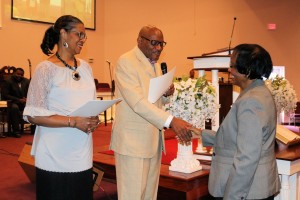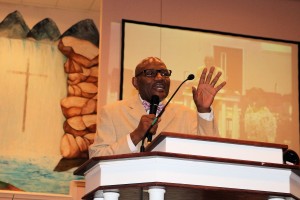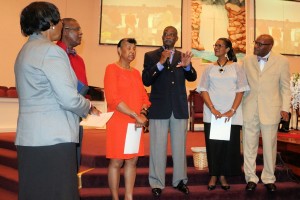
While standing in the pulpit of First Baptist Church of Carrollton, Pastor Bradley Bell began to share a story about a recent health scare.
All eyes were on Bell, smartly dressed in a tan suit, white button-down shirt and pink bowtie on that particular Sunday in May. As he prepared to talk to the crowd, he flashed a welcoming smile. There is no question why the phrase, “A Friendly Church with a Friendly Pastor,” is prominently featured on the church’s Web site.
As Bell began to share his testimony, it was clear that this was going to be a story that would end with an important lesson. You could see it in his eyes — gazing out at the congregation from behind the lenses of his black-rimmed glasses — and hear it in his voice, which reverberated through the sanctuary.
“A couple of weeks ago, I had been feeling tired and I didn’t know exactly what it was so I went to the doctor,” said Bell. “I said, ‘I’m just tired. I don’t know why I’m tired like this all the time.’”
The doctor asked him if he was getting enough sleep, to which he replied, “Sometimes.” When the doctor suggested that a lack of sleep could be contributing to how he was feeling, he remembered something he learned through the Living Well with Chronic Disease classes provided by Tanner Health System’s Get Healthy, Live Well. He learned about the importance of taking an active role in his health care and how to better communicate with healthcare providers.
Before taking the classes, he would let his doctor decide what healthcare options were best for him without providing much input himself. But during his recent doctor’s visit, Bell asked for a colonoscopy even though he wasn’t due for another exam until 2019. He had the colonoscopy, which uncovered a flat polyp.
Bell later found out that it was non-cancerous.
“We have to be proactive in talking to our healthcare providers, talking to them and telling them how we feel,” he said.
The Living Well with Chronic Disease program helped nine First Baptist Church of Carrollton members learn how to talk to their healthcare providers and self-manage their chronic diseases. Those who completed the class were Elerie Daniel, Helen Dukes, Gail Reddish, Emanuel Geter, Nettie Geter, Corlis Long, Cherry Mays, Evelyn Moss and Clois Reese. The class was taught by Bell and Jarvis Daniel.
First Baptist Church of Carrollton partnered with Get Healthy, Live Well to offer the Living Well with Chronic Disease program, which was developed by Stanford University. The six-session Living Well program helps participants manage any chronic disease, including arthritis, cancer, depression, diabetes, heart disease and hypertension. Family members and informal caregivers are also encouraged to attend classes.
During the church service, Geter shared more details about the class.

“The class was designed to help people with chronic conditions become positive, active self-managers, and if you’re going to be a self-manager, you need self-management skills,” she said. “We learned and practiced self-management skills that can be used on a daily basis while living with chronic conditions.”
She went on to discuss three important self-management tools they used to help make their lives easier — problem solving, decision making and action planning.
“The action plans are probably your most important self-management tool,” said Geter. “What we do about something is largely determined by how we think about things; so by learning self-management skills, you can ease the problems of living with your condition or conditions.”
She noted that a person’s attitude can’t cure a chronic condition, but positive attitudes and certain management skills can make his or her condition easier to live with. A healthy way to live with chronic conditions is to work at overcoming physical, emotional and mental problems caused by the condition. The challenge is learning how to function at his or her best regardless of the difficulties life presents.
“The goal is to achieve the things you want to do and get pleasure from life,” said Geter. “You know, God gave us the free will to make choices. If you choose to be an active, positive self-manager, undergo all the best treatments that your healthcare professionals have to offer and be proactive in your day-to-day management, you will live a healthier life.”
Participants also learned how to be better communicators with their family and friends.
“The class was very informative, eye-opening, interesting and enjoyable,” said Geter. “We want to thank our facilitators, Pastor Bell and Brother Daniel. We want to thank Tanner Health System for making the class possible.”
For more information about the Living Well With Chronic Disease program, visit www.GetHealthyLiveWell.org.

###





